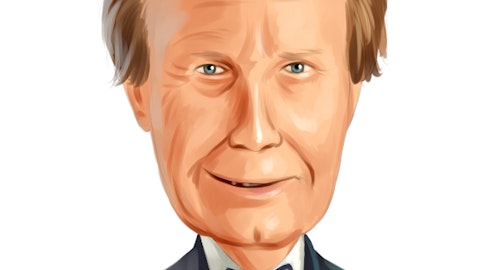Rell Winand: On the blackout period, so 15 days before the end of the quarter is a blackout period and then you can — blackout period is lifted the third business day and the earnings begin [Technical Difficulty] you don’t get anything until [Multiple Speakers]…
Operator: Your next question comes from [Roger Goldman] who’s a Private Investor.
Unidentified Analyst: First of all, congratulations, really well done. This seems like it’s going exactly according to the way you told us it would go. And in that connection, any surprises so far with the integration, either good news or bad news?
Shahram Askarpour: Surprises, from my end, it’s navigating a large company and the level of [Multiple Speakers], I knew it was going to be a challenge, but it’s internal communications within Honeywell. You’re talking to a group of people that you signed an agreement with and we all understand what it is. But then at the end of the day, you’re getting information from some guys down there some and they have their own opinion.
Rell Winand: A lot of levels, a lot of layers…
Shahram Askarpour: [Multiple Speakers] little bit harder. But I think we’ve learned a lot of lessons here this time around out of this that in better ways of making this happen smoothly. Having said that, we’re told by folks at Honeywell that this has been by far the smoothest transition that they’ve done with any of these [Technical Difficulty].
Unidentified Analyst: Well, a lot of people and companies have made a lot of money doing just what you’re doing, which is unencumbering a division from all the corporate, I don’t want to say nonsense, but all the corporate structure inherent in being a small division of a big company. And sometimes, there are financial surprises, sometimes good, sometimes bad, that don’t rise to the level of, oh, we’ve got to redo the contract or we’ve got to walk away. But nonetheless, they’re kind of shocking. And what I’m hearing you say is it’s more difficult managerially, but financially, it’s right on target.
Shahram Askarpour: We have not had any negative surprises on the [finance].
Unidentified Analyst: That’s a good way to say it, I hear you. Secondly, just I think the bank — I was going to ask you a question about the bank financing. It sounds like you’re generating a ton of cash and you’re using it to pay down a ton of debt. The bank would be cooperative if you made another acquisition and that debt went up again substantially…
Shahram Askarpour: Yes, actually, the conversation with them, they would be very happy to provide us based on the EBITDA of the next business that we will [Multiple Speakers] term loan for that EBITDA that then later on we can convert [Multiple Speakers] to the line of credit. So they’ve been very supportive.
Unidentified Analyst: And you’re going to save probably $0.5 million to $1 million in interest this year. So good job on that. And do you feel that you have the management to make another acquisition in the next year?
Shahram Askarpour: Yes, we do.
Unidentified Analyst: I was hoping for a really simple answer like that. And last question is, I know Mike left, anything there we should know or…
Shahram Askarpour: I think related to the company, it was a personal decision.
Unidentified Analyst: All right. Good. And thanks for stepping back in, this is a critical time for the company. Critical, critical time. Anyway, I just want to end by saying, as you guys know, I’ve been, first, my dad and now my sister and I have been longtime shareholders, and this is what we’ve been hoping for, for years and years. So just well done. Well done, you guys are on your way to something really building a fabulous company here.
Rell Winand: Thank you for your support.
Shahram Askarpour: Thank you very much.
Rell Winand: Have a good one. Happy holidays.
Operator: This concludes our question-and-answer session and concludes the conference call. Thank you for attending today’s presentation. You may now disconnect.
Follow Innovative Solutions & Support Inc (NASDAQ:ISSC)
Follow Innovative Solutions & Support Inc (NASDAQ:ISSC)
Receive real-time insider trading and news alerts


